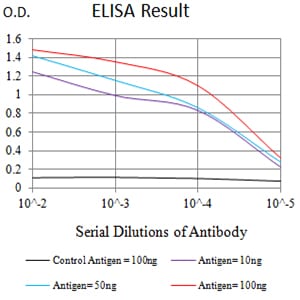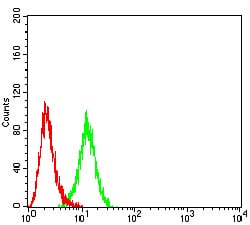

| WB | 咨询技术 | Human,Mouse,Rat |
| IF | 咨询技术 | Human,Mouse,Rat |
| IHC | 咨询技术 | Human,Mouse,Rat |
| ICC | 技术咨询 | Human,Mouse,Rat |
| FCM | 1/200 - 1/400 | Human,Mouse,Rat |
| Elisa | 1/10000 | Human,Mouse,Rat |
| Aliases | TNFRSF4; ACT35; CD134; IMD16; TXGP1L |
| Entrez GeneID | 7293 |
| clone | 2D1B8 |
| WB Predicted band size | 29.3kDa |
| Host/Isotype | Mouse IgG2b |
| Antibody Type | Primary antibody |
| Storage | Store at 4°C short term. Aliquot and store at -20°C long term. Avoid freeze/thaw cycles. |
| Species Reactivity | Human |
| Immunogen | Purified recombinant fragment of human OX40 (AA: extra 29-214) expressed in HEK293 cells. |
| Formulation | Purified antibody in PBS with 0.05% sodium azide |
+ +
以下是关于OX40抗体的3篇参考文献及其摘要:
---
1. **文献名称**:*OX40 (CD134) and OX40L interaction in immunological disorders and potential therapeutics*
**作者**:Weiss, J. M., et al.
**摘要**:该综述探讨了OX40/OX40L信号通路在T细胞激活与存活中的作用,分析了OX40激动型抗体在增强抗肿瘤免疫应答中的潜力,并总结了其在癌症和自身免疫疾病中的临床前及早期临床试验结果。
2. **文献名称**:*Targeting OX40 promotes tumor-localized CD8+ T cell responses*
**作者**:Linch, S. N., et al.
**摘要**:研究通过小鼠模型证明,OX40激动型抗体可促进肿瘤微环境中CD8+ T细胞的增殖与功能,抑制调节性T细胞(Tregs),显著提升抗PD-1疗法的疗效,为联合免疫治疗提供了实验依据。
3. **文献名称**:*Phase I study of anti-OX40 antibody (PF-04518600) in patients with advanced solid tumors*
**作者**:Segal, N. H., et al.
**摘要**:该I期临床试验评估了OX40抗体PF-04518600的安全性及初步疗效,结果显示其耐受性良好,部分患者出现肿瘤缩小或疾病稳定,支持进一步探索其与其他免疫疗法的联合应用。
---
如需更多文献或具体研究方向,可进一步补充说明。
OX40 (CD134), a member of the tumor necrosis factor receptor (TNFR) superfamily, is primarily expressed on activated T cells, particularly CD4+ and CD8+ effector T cells. Its ligand, OX40L (CD252), is found on antigen-presenting cells. The OX40/OX40L signaling pathway plays a critical role in promoting T cell survival, proliferation, and memory formation, serving as a co-stimulatory immune checkpoint. Therapeutic targeting of OX40 has emerged as a promising strategy in immuno-oncology and autoimmune diseases.
Agonistic OX40 antibodies enhance T cell activation and effector functions, potentially overcoming tumor-induced immunosuppression. Preclinical studies show that OX40 agonists synergize with checkpoint inhibitors (e.g., anti-PD-1) to boost antitumor immunity. Conversely, antagonistic OX40 antibodies block OX40/OX40L interactions, dampening excessive T cell responses in autoimmune disorders like rheumatoid arthritis or psoriasis.
Clinical trials of OX40-targeting antibodies have yielded mixed results, with efficacy influenced by factors such as antibody epitope, binding affinity, and dosing schedules. Safety profiles generally show manageable toxicity, though cytokine release syndrome remains a concern. Ongoing research focuses on optimizing antibody design (e.g., bispecific antibodies) and combination therapies to improve clinical outcomes. Biomarker development is also critical to identify patient populations most likely to benefit from OX40-targeted therapies.
×